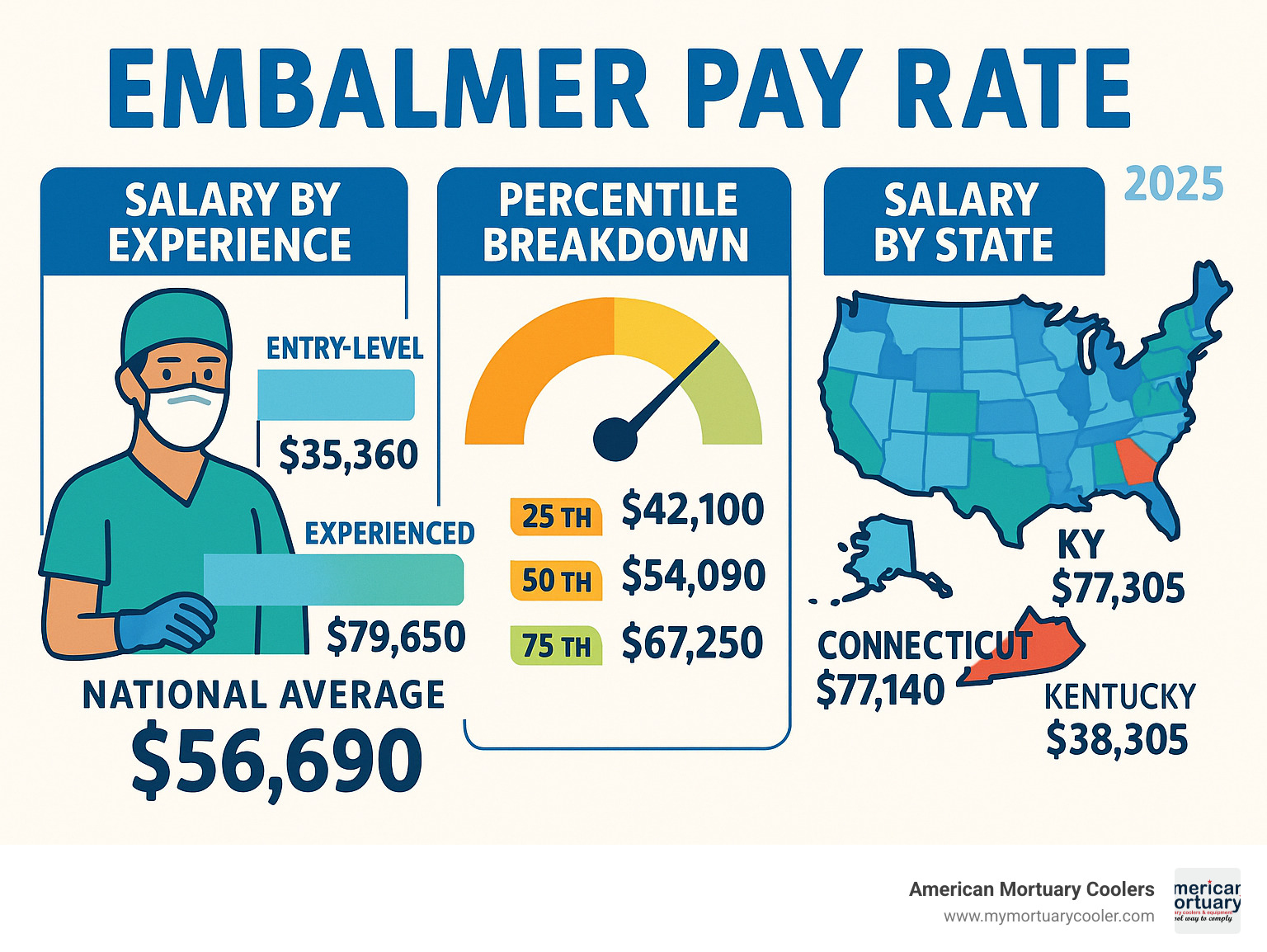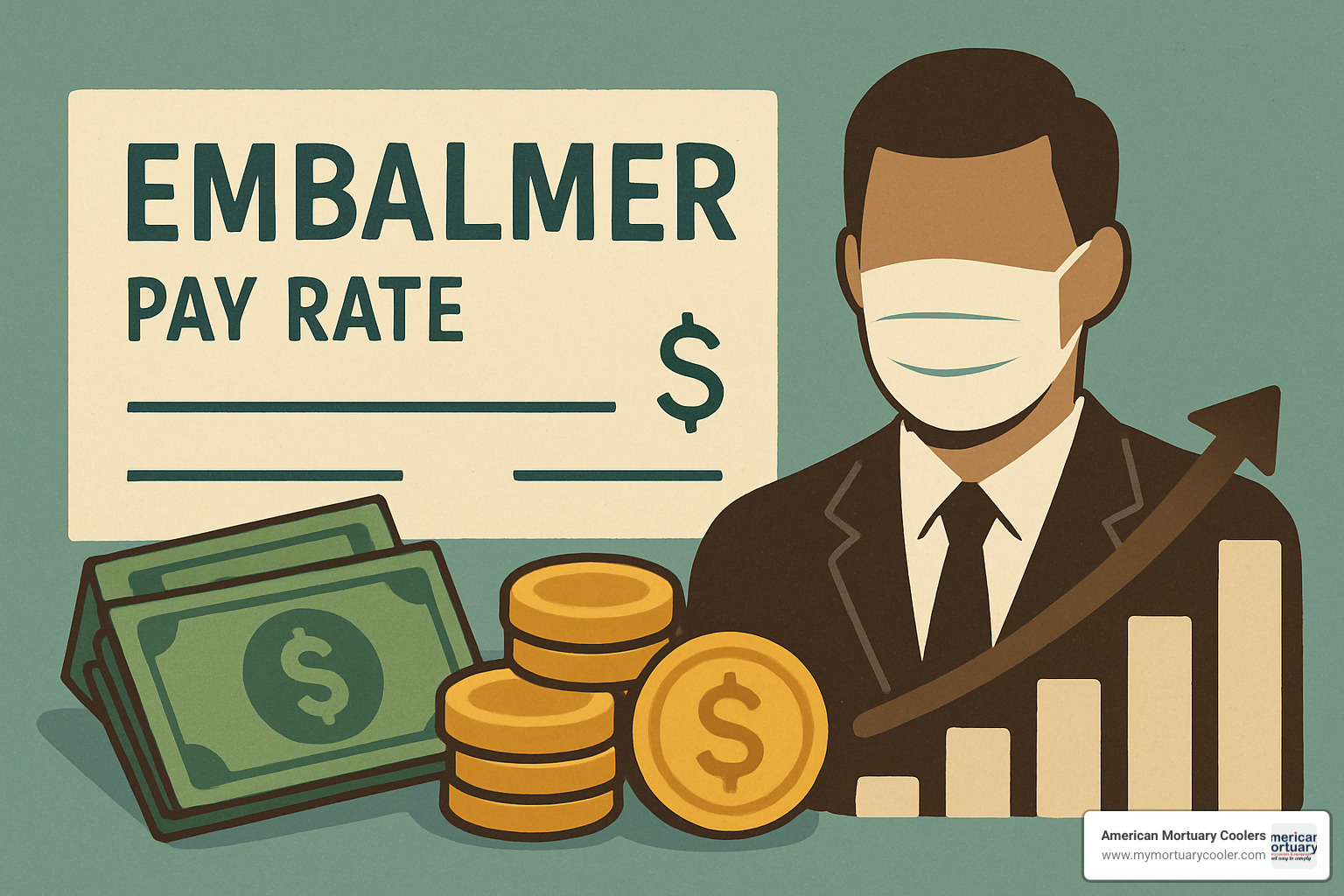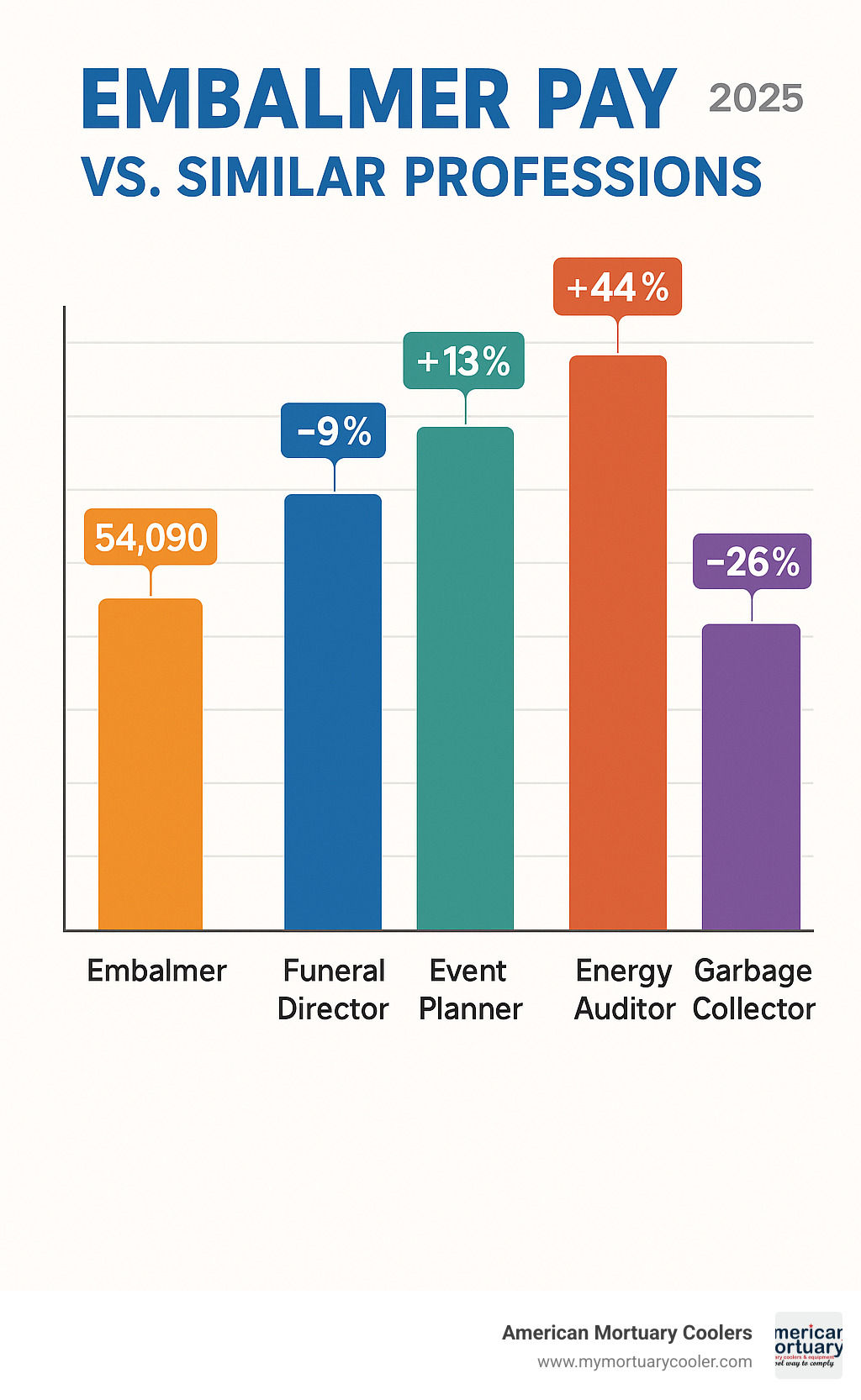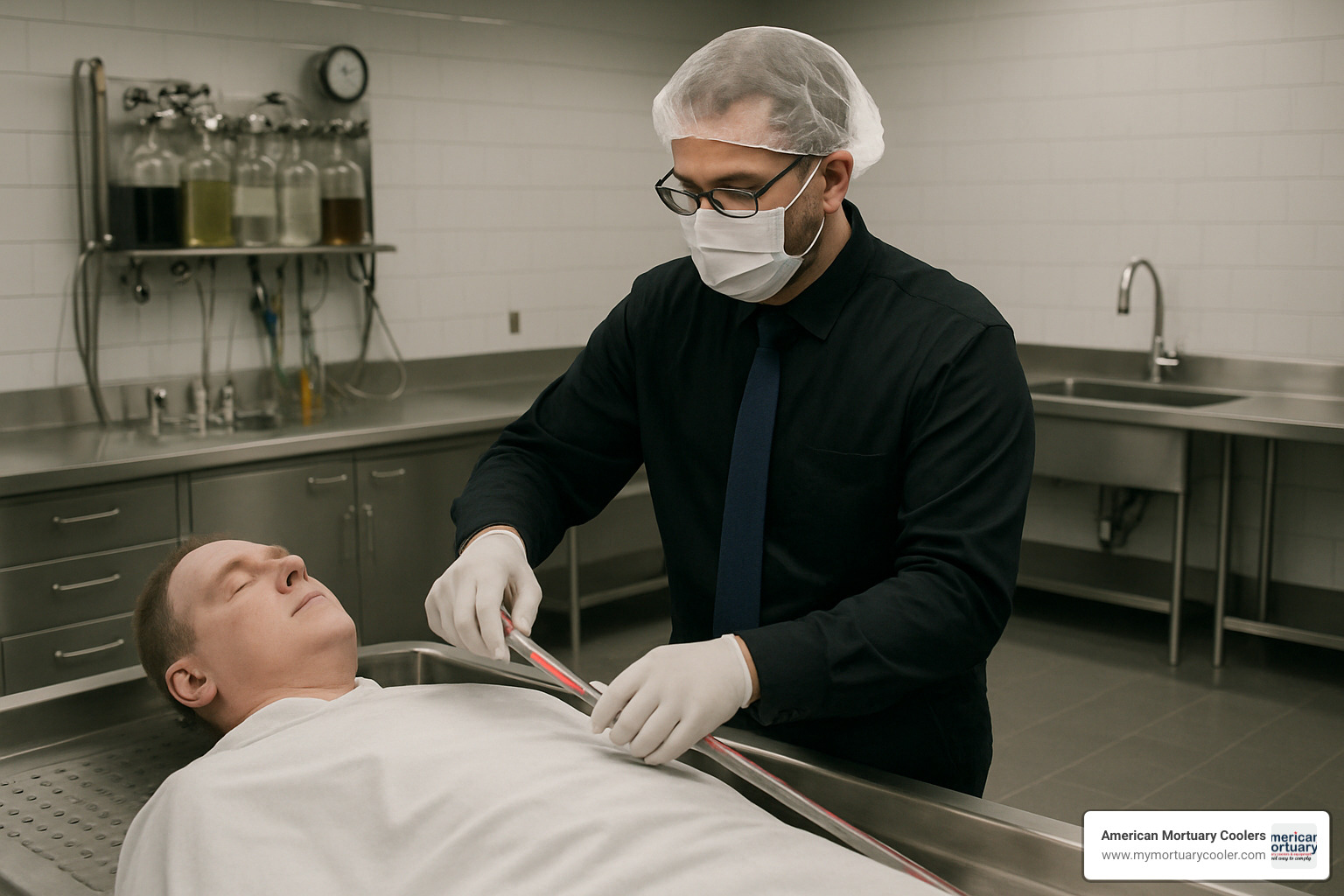Why Understanding Embalmer Pay Rates Matters for Your Career
Embalmer pay rate varies significantly across the United States, with professionals earning between $35,360 and $79,650 annually depending on experience, location, and industry specialization. Here's what you need to know:
Quick Embalmer Pay Rate Facts:
- National Average: $56,690 per year ($27.26 per hour)
- Median Salary: $54,090 annually
- Entry-Level Range: $35,360 - $38,670 per year
- Experienced Range: $60,170 - $79,650 per year
- Top-Paying State: Connecticut at $77,140 average
- Lowest-Paying State: Kentucky at $38,305 average
Whether you're considering mortuary science as a career path, negotiating your current salary, or planning staffing budgets for your funeral home, understanding embalmer compensation is crucial. The profession requires specialized training, state licensing, and significant emotional resilience - factors that directly impact earning potential.
Geographic location plays the biggest role in determining pay rates. Embalmers in metropolitan areas like New York-Newark-Jersey City earn up to $73,770 annually, while those in rural markets may start closer to minimum wage requirements.
As Mortuary Cooler, I've worked with funeral home directors nationwide who consistently ask about staffing costs and competitive compensation packages. Understanding embalmer pay rate trends helps funeral homes attract and retain skilled professionals while managing operational expenses effectively.

Simple guide to embalmer pay rate terms:
National Embalmer Pay Rate Snapshot (2025)
Let's explore the numbers that matter most for your career planning. The latest Occupational Employment and Wages, May 2023 data from the Bureau of Labor Statistics shows embalmer pay rates have reached a mean annual wage of $56,690, with the median sitting at $54,090.
What's particularly encouraging is the upward trend we're seeing. Back in May 2022, the mean annual wage was $54,120 - that's a solid bump of over $2,500 in just one year. When you zoom out further, embalmer pay rates have increased by approximately 34.72% since 2004, which actually outpaces inflation and many other professions.
The wage distribution tells an interesting story about career progression in this field. At the 10th percentile, new embalmers start around $17.00 per hour ($35,360 annually), while those at the 25th percentile earn $18.59 per hour ($38,670 yearly). The middle ground sits at $26.01 per hour for the median, jumping to $26.49 per hour at the 75th percentile. The top earners in the 90th percentile command $38.29 per hour, translating to $79,650 annually.
Here's something that might surprise you: there are only about 3,380 embalmers employed across the entire United States. That relatively small number actually works in your favor when it comes to job security and negotiating power. Some rural areas have location quotients as high as 9.93, meaning they employ nearly 10 times more embalmers per capita than the national average - talk about being in demand!
Entry-Level Embalmer Pay Rate
Starting your embalming career typically means earning somewhere between $35,360 and $38,670 annually. While that might seem modest, most funeral homes understand you're learning specialized skills that take time to master.
Apprenticeship programs form the backbone of entry-level compensation. Most states require 1-2 years of hands-on training under a licensed embalmer, and many funeral homes are willing to invest in promising candidates even before they complete their licensing requirements. During this on-the-job training period, you'll gain experience with embalming equipment, chemical procedures, and the emotional aspects of the profession.
Geography plays a huge role in your starting salary. An entry-level embalmer in Connecticut might start around $52,000, while someone beginning their career in Kentucky could start closer to $28,000. Our research shows that entry-level embalmers with 0-2 years of experience report average total compensation of $42,213, though some markets pay as low as $15.17 per hour.
The good news? The learning curve is steep, and most embalmers see significant pay increases within their first five years as they develop their skills and prove their value to employers.
Experienced Embalmer Pay Rate
Once you've mastered the craft, the financial rewards become much more attractive. Experienced embalmers typically earn between $55,090 and $79,650 annually, with 10+ years of experience opening doors to the highest pay brackets.
Supervisory roles can boost your income by 10-15% as you manage other embalmers and oversee prep room operations. If you develop expertise in restorative art mastery - particularly trauma reconstruction or complex restoration work - you'll command premium rates that funeral homes are happy to pay for specialized skills.
Don't overlook the earning potential of shift differentials and overtime opportunities. Night and weekend work often pays 15-20% more, and many experienced embalmers earn significant overtime during busy periods. We've seen professionals in high-demand markets like New York or California report total compensation exceeding $80,000 when including overtime and bonuses.
The embalmers who earn at the very top of the scale often specialize in areas like autopsy assistance, donation programs, or become the go-to expert for complex reconstruction cases. These specialized skills are rare and valuable - exactly what you want in a profession with only 3,380 practitioners nationwide.
How Location Impacts Embalmer Pay Rates

Where you work as an embalmer makes a huge difference in your paycheck. We're talking about a spread of nearly $40,000 between the highest and lowest paying states. That's not pocket change - it's the difference between scraping by and living comfortably.
Geographic location creates the biggest swings in embalmer pay rates you'll see anywhere. A funeral home in Connecticut might pay double what you'd earn doing the exact same work in Kentucky. Embalmer Salary in California | Salary.com shows California embalmers averaging $60,216 annually, which sits well above the national average.
The math gets interesting when you factor in cost of living. That $77,000 salary in Connecticut might not stretch as far as $45,000 in rural Kentucky when you consider housing, taxes, and daily expenses. But the gap is still significant enough to make location a major career decision.
Metropolitan areas typically offer the highest wages, with New York-Newark-Jersey City leading at $73,770 average annual wage. Meanwhile, rural markets often start closer to minimum wage requirements but may offer other benefits like lower stress, closer community ties, and more affordable living costs.
Population density plays a big role too. Areas with aging populations and limited embalmer supply naturally drive wages higher. Some nonmetropolitan areas show employment concentrations nearly 10 times the national average, creating tight labor markets that benefit workers.
Highest-Pay Regions at a Glance
Connecticut takes the crown at $77,140 average annual salary, making it the gold standard for embalmer compensation. The state's high cost of living and affluent population create demand for premium funeral services, which translates to better pay for skilled embalmers.
New York follows closely at $70,440 average, with the NYC metropolitan area pushing even higher at $73,770. The sheer volume of funeral homes and the complexity of urban funeral services justify these premium wages. Plus, union representation in some areas helps maintain competitive compensation packages.
Nebraska shows up as a surprise winner in some surveys at $78,940 annually. This reflects the state's agricultural economy and tight labor market for skilled funeral service workers. Rural areas with limited embalmer supply often pay premium rates to attract and retain talent.
These top-paying regions share common traits: higher cost of living that requires competitive wages, aging populations creating consistent demand, and limited embalmer supply relative to the number of funeral homes. Many also offer excellent benefits packages, with Connecticut embalmers reporting 67% have medical insurance and 58% receive dental coverage.
Budget-Friendly Markets With Lower Pay
Kentucky sits at the bottom of the pay scale at $38,305 average, which is about 60% below the national average. But before you write off these markets, consider that lower wages often come with significantly lower living costs. Your dollar might stretch further than you think.
Colorado presents an interesting case study at $48,660 average - about 32% below the national average. This creates a notable gap when you compare embalmer wages to other careers in the state. Energy auditors in Colorado average $78,000, and real estate agents earn around $61,000, making the embalmer pay rate less competitive locally.
These budget-friendly markets often provide excellent training opportunities for new embalmers. Lower competition means more hands-on experience and mentorship from experienced professionals. Many embalmers start their careers in these regions, gain valuable skills, then move to higher-paying markets later.
Regional demand varies significantly based on local demographics, cultural practices, and economic conditions. Some areas with lower average wages still offer overtime opportunities or shift differentials that can boost total compensation for motivated workers.
Factors That Move the Needle on Your Embalmer Pay Rate
Your embalmer pay rate isn't just about where you work - it's about who you are as a professional. Several key factors can significantly boost your earning potential, and understanding them helps you make smart career moves.
Education opens doors to higher pay. Most states require an associate's degree in mortuary science as the bare minimum, but going beyond that pays off. Embalmers with bachelor's degrees often see their starting salaries jump 10-15% higher than their peers. The real money comes from continuing education and specialized training in areas like trauma reconstruction, autopsy assistance, and donor programs.
State licensing requirements create interesting pay patterns. Every state demands embalmer licensing, but the hoops you jump through vary dramatically. States with tougher licensing requirements - think extensive apprenticeships and rigorous exams - typically see higher average wages. It's simple supply and demand: fewer people can meet the requirements, so those who do get paid more.
Experience counts, and it shows in your paycheck. Fresh embalmers with 0-2 years typically earn $35,000-$42,000 annually. By years 3-5, you're looking at $42,000-$48,000 as you build your skills. The sweet spot comes at 6-10 years when you hit $48,000-$55,000, and seasoned professionals with 10+ years often crack $55,000-$80,000 or more.
Your workplace matters more than you might think. While most embalmers work in traditional funeral homes under Death Care Services, other industries offer different compensation packages. Hospital systems often pay higher hourly rates for autopsy work, and medical examiner offices provide government pay scales with excellent benefits. Some embalmers working in Employment Services average $26.32 per hour, while others in specialized services can earn significantly more.
Unionization and shift schedules can boost your bottom line. Embalmers in unionized facilities often earn 15-20% more than their non-union counterparts. Night and weekend shifts typically come with premium pay differentials, and overtime opportunities during busy periods can substantially increase your annual earnings.
Working with funeral homes across Tennessee, Georgia, Illinois, South Carolina, Texas, California, New York, and Pennsylvania, we've noticed that facilities investing in quality prep room equipment often pay higher wages to attract skilled embalmers. It makes sense - funeral homes that prioritize professional tools understand the value of professional staff.
Understanding Mortician Salaries – American Mortuary Coolers & MedicalStretchers.com provides additional insights into the compensation trends we observe across our service regions. The bottom line? Your embalmer pay rate reflects your investment in education, experience, and specialization.
Embalmer Pay vs. Similar Professions

When considering an embalming career, it's natural to wonder how your potential earnings stack up against other professions. The embalmer pay rate sits in an interesting middle ground compared to careers requiring similar education levels and specialized skills.
Let's look at how embalmers compare to related professions. Funeral directors who also hold embalming licenses typically earn around $58,920 annually - about $4,800 more than embalmers working solely in preparation roles. This makes sense since funeral directors handle business operations, family meetings, and regulatory compliance beyond the technical embalming work.
Event planners earn slightly less at $49,370 annually, making embalming about 10% more lucrative. Both careers require attention to detail and working under pressure, but embalmers enjoy more predictable schedules without the evening and weekend events that planners regularly manage.
The comparison gets interesting when we look at real estate agents, who average $61,000 annually - about 11% more than embalmers. However, real estate income fluctuates dramatically with market conditions and individual sales performance. Many agents struggle during slow markets, while embalmers enjoy steady demand regardless of economic cycles.
Energy auditors represent one of the bigger pay gaps, earning around $78,000 annually - a full 31% more than embalmers. This reflects the current emphasis on energy efficiency and the technical certification requirements for auditing work. However, energy auditing requires different skills and often involves extensive travel between job sites.
On the lower end, embalmers significantly out-earn several service professions. Garbage collectors average $40,000 annually, making embalming 35% more lucrative. Exterminators earn around $37,000, putting embalmers 46% ahead in earning potential.
What's particularly noteworthy is the job satisfaction factor. Embalmers consistently rate their job satisfaction at 4.12 out of 5 - higher than many professions that pay more. This reflects the meaningful nature of helping families during difficult times, the technical mastery involved, and the respect that comes with this specialized profession.
The pay gap analysis reveals an important truth: embalmers often trade some earning potential for job security, steady schedules, and work that feels meaningful. Unlike commission-based careers or seasonal industries, embalming provides consistent income and the satisfaction of serving others during their most challenging moments.
Career Growth, Benefits & Negotiation Tips
When considering embalmer pay rates, it's important to look beyond the base salary. Your total compensation package often tells a much more complete story about your earning potential in this rewarding field.
Health benefits make a real difference in your financial picture. About 62% of embalmers receive medical coverage through their employers, while 41% get dental benefits and 35% have vision insurance. These benefits can be worth thousands of dollars annually, especially when you consider the rising cost of healthcare.
Retirement planning varies significantly between employers. Larger funeral home chains typically offer 401(k) plans with company matching, while smaller family-owned operations might provide profit-sharing arrangements instead. We've seen profit-sharing bonuses range from $428 to $10,000 in participating companies.
Paid time off averages 15-20 days annually, though this often increases with tenure. Many funeral homes also cover continuing education costs, including licensing renewal fees and specialized training courses. This investment in your professional development can easily save you $1,000-$3,000 per year.
The overtime opportunities in this field are substantial. During busy periods - which unfortunately can't be predicted - experienced embalmers often earn significant additional income. Night and weekend shifts typically pay 15-20% premiums, making these less desirable hours financially attractive.
Career advancement paths offer multiple ways to increase your earning potential. You might move into senior embalmer roles supervising prep room operations, or expand into funeral directing to work directly with families. Some embalmers transition into mortuary management, overseeing entire facility operations, while others find fulfillment teaching at mortuary science programs.
Business ownership represents the highest earning potential. Independent funeral home owners can earn well above typical employee salaries, though this path requires significant business acumen and capital investment.
When it comes to salary negotiations, timing matters enormously. Approach these conversations during busy seasons when your value is most apparent to management. Document your specialized skills - whether that's restorative art expertise, autopsy experience, or efficiency improvements you've brought to operations.
Research local market rates thoroughly using multiple sources, and remember to consider your total compensation package, not just base salary. A slightly lower salary with excellent benefits and advancement opportunities often proves more valuable long-term than higher pay with limited growth potential.
The Ultimate Guide to Embalmer Salary: What You Need to Know provides additional insights into negotiation strategies that work specifically in our industry.
From our experience working with funeral homes across multiple states, we've noticed that facilities investing in quality equipment and modern prep rooms tend to offer more competitive compensation packages. They understand that skilled embalmers are essential to their operation's success and reputation.
Frequently Asked Questions About Embalmer Pay
What is the future job outlook for embalmers?
The future looks steady for embalmers, though it's not exactly a boom market. The Bureau of Labor Statistics projects consistent demand through 2032, thanks to our aging population. But here's the reality check - growth rates will likely stay modest because more families are choosing cremation and alternative funeral services.
The changing landscape affects embalmer pay rates in interesting ways. While traditional embalming demand may plateau, embalmers with specialized skills are becoming more valuable. Those trained in restoration work, autopsy assistance, or donor programs will likely see the best opportunities and highest pay.
Future trends are reshaping the profession. Technology integration means embalmers need ongoing training to stay current. The green burial movement is growing, though it hasn't dramatically impacted traditional services yet. Industry consolidation is changing employment patterns - larger funeral home chains often offer better benefits but may standardize pay scales.
Regulatory changes could also impact licensing requirements and, consequently, embalmer pay rates. States with stricter requirements tend to see higher wages, so any changes in licensing standards could shift compensation patterns.
How much can certifications boost my embalmer pay rate?
Specialized certifications can significantly boost your earning potential - we're talking 10-25% increases depending on the skill and local demand. It's one of the most direct ways to increase your value in the marketplace.
Autopsy assistance training commands some of the highest premiums, adding $3,000-$8,000 annually to your base salary. Medical examiner offices and hospitals actively seek embalmers with this expertise. Restorative art certification typically increases earnings by $2,000-$5,000, especially in metropolitan areas where families expect high-quality reconstruction services.
Donor program specialization offers substantial pay boosts of $4,000-$10,000 annually. As organ and tissue donation becomes more common, embalmers skilled in working with donor cases are increasingly valuable. Hazardous materials handling certification adds $1,000-$3,000 to your annual income, particularly important for trauma cases.
Management training provides the biggest long-term impact, typically resulting in 15-20% salary increases when you move into supervisory roles. This path also opens doors to funeral director positions and facility management opportunities.
Which industries outside funeral homes hire embalmers?
While most embalmers work in traditional funeral homes, several other industries offer interesting career paths with different compensation structures.
Medical Examiner Offices provide government positions with excellent benefits packages. The pay might start lower than private sector work, but the job security, health insurance, and retirement benefits often make up the difference. Plus, you'll gain valuable autopsy experience that makes you more marketable.
Hospital Systems hire embalmers for autopsy assistance and pathology support. These positions often pay higher hourly rates than funeral homes, though they may not offer full-time hours. The medical environment provides excellent learning opportunities and networking with healthcare professionals.
Educational Institutions employ experienced embalmers as instructors and researchers. Mortuary science programs need qualified teachers, and these positions typically offer academic benefits like tuition assistance and flexible schedules. The pay varies widely but often includes excellent benefits.
Military Services need mortuary affairs specialists, offering unique career paths with comprehensive benefits and training. Private Contractors serve multiple funeral homes, often earning higher hourly rates but with less job security. Equipment Manufacturers like us at American Mortuary Coolers sometimes need embalmers for technical support and training roles, combining industry knowledge with business experience.
These alternative employers often structure compensation differently. Government positions emphasize benefits and job security, while private contractors focus on higher hourly rates. The key is finding what matches your career goals and lifestyle preferences.
Conclusion

After diving deep into embalmer pay rate data from across the country, one thing becomes crystal clear: this profession offers solid earning potential for those willing to invest in their skills and consider their location carefully. While the national average of $56,690 gives you a starting point, your actual paycheck will depend heavily on where you work, how much experience you bring to the table, and what specialized skills you develop along the way.
Geography remains the biggest game-changer when it comes to compensation. An embalmer starting out in Connecticut can expect to earn nearly double what their counterpart in Kentucky makes. But here's the thing - that Kentucky embalmer might enjoy a much lower cost of living and a tighter-knit community feel that money can't buy.
The experience factor is equally compelling. Entry-level embalmers earning $35,360 can realistically expect their income to more than double as they gain expertise and potentially move into supervisory roles. Those willing to pursue specialized training in restorative art, autopsy assistance, or donor programs often see the fastest salary growth.
What really sets this profession apart is the job satisfaction rating of 4.12 out of 5. That's remarkably high for any career, let alone one that requires dealing with death daily. It speaks to the meaningful nature of the work and the satisfaction that comes from helping families during their most difficult moments.
At American Mortuary Coolers, we've had the privilege of working with funeral homes throughout Tennessee, Georgia, Illinois, South Carolina, Texas, California, New York, and Pennsylvania. Time and again, we see that facilities investing in quality prep room equipment and competitive compensation packages attract the most skilled embalmers - and keep them longer.
Your path to higher earnings might involve relocating to a higher-paying market, pursuing that restorative art certification you've been considering, or taking on supervisory responsibilities. Maybe it means exploring opportunities with medical examiner offices or hospital systems that offer different compensation structures.
The funeral industry continues evolving, but the need for skilled, compassionate embalmers remains constant. Whether you're just starting your mortuary science journey or looking to advance your current career, understanding these embalmer pay rate trends helps you make smart decisions about your professional future.
If you're new to the field and want to learn more about getting started, our Beginners Guide to Mortuary Science walks you through everything from education requirements to what to expect in your first job. Because at the end of the day, this career isn't just about the paycheck - it's about finding purpose in serving others when they need it most.



















